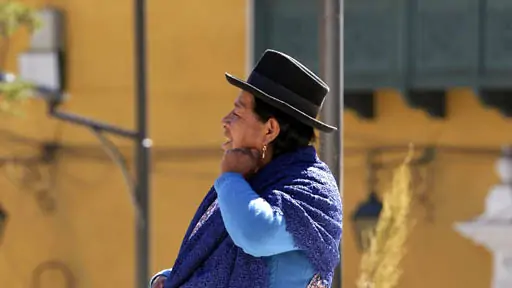Indigenous Calendar December, 2016: Bolivian Cholitas Re-enfranchised

When the history books are written, the 2016 entry will contain two events that surprised most of the world: the vote in the United Kingdom to leave the European Union and the vote in the United States to elect Donald Trump to the presidency.
A year ago I was on assignment in the Bolivian Andes. Bolivia is one of the few countries left in the world where the majority of its citizens are of indigenous descent. Its second-largest indigenous group is the Aymara people. Among the most disenfranchised demographic groups in the world are indigenous women; Aymara women in Bolivia are no exception. They have been at the bottom of a class-based social hierarchy at the hands of the Inca, followed by Spanish colonists and, most recently, post-colonial rulers.
In colonial times Bolivia's indigenous people were forced to wear European-style clothes. As a result, in the post-colonial period some of them were perceived, by the ruling class, to have gained aspirations to climbing the social ladder. The derogatory term Chola was coined to refer to indigenous women who were perceived this way. As elsewhere — and as we often see throughout history — the mere popularization of that derogatory term made it harder for Bolivian Aymara women to climb the social ladder. Mothers raised their daughters not to aspire above Bolivia's working and servant classes.
Sixty years ago things began to change in Bolivia. Cholas had turned the tables by self-styling their European clothing and, according to an apocryphal account, continuing to wear imported, English bowler hats that were given to them in sympathy a hundred years earlier. The diminutive form, Cholita replaced Chola and started to become a non-derogatory term.
Just ten years ago Cholitas were still excluded, marginalized and disenfranchised in Bolivia. Then Evo Morales became Bolivia's first indigenous president. There has since been a reversal of attitudes toward Cholitas. In October, 2013 the capital, La Paz, passed a new law officially recognizing them as part of its cultural heritage. Today we see Cholitas like the one in this month's photo with head held high in pride. But the changes go beyond mere acceptance. Aymara women in Bolivia now hold high-esteem jobs across all kinds of professions. That was almost unheard of ten years ago. And they encourage their daughters to aspire to the same.
Political commentary on the 2016 events in the United Kingdom and the United States notes that they revealed the disenfranchisement felt by a large part of the electorate in those two countries. In three days there will be a constitutional reform referendum in Italy and an election in Austria; there are twelve more elections in Europe in the coming year. The outcomes will help us judge whether there truly is a burgeoning trend among the disenfranchised to reject the establishment status quo. The European electorate might be able to learn something from the Cholitas of Bolivia.
If you enjoyed reading this article, please consider supporting independent, advertising-free journalism by buying us a coffee to help us cover the cost of hosting our web site. Please click on the link or scan the QR code. Thanks!


